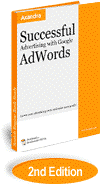This site is for sale,
Learn More
Google AdWords
Organize Your Ad Groups
By Esoos Bobnar
www.searchenginehelp.com
Originally Published: January 2005
Continued From:
<<< Choosing Your Match Type
Organize Your Ad Groups
Once you've created a keyword list and decided which level of matching to apply to each keyword or phrase, you can move on to the next stage of managing an effective keyword list: organization. It's always better to have a small but well-organized and easily trackable keyword list than a large but messy list. Any extra keywords you throw in when getting started are just going to muddy your tracking data and make it harder for you to tell which keywords are actually performing well. Our advice is:
start small, grow smart.
Your small keyword list will gradually grow into a large keyword list as you gain feedback on your existing list and add keywords in response to that feedback. Your keyword list will grow in an
iterative
process as you keep and improve keywords that are profitable, discard those that aren't, and brainstorm new keywords and categories to add to the mix.
Keep your keywords organized into meaningful categories, rather than dumping a huge mess of keywords into Google and hoping something takes off. Organize your categories into similar keywords and phrases, and from there into similar max bids. Your most expensive keywords should go in their own category. As your list grows, you will want to fine tune your maximum bid by category, not by individual keyword. Manually adjusting each keyword in a 1,000 word list gets old really fast. Trust us on this.
The same goes for tracking. As your list grows, you'll want to track by category, not by keyword. Once you have identified high performing categories, then you can consider fine tuning and tracking within those categories. Ad categories allow you to get the big picture of your campaign rather than wasting time on each detail. The advertiser who is obsessive about adjusting every little keyword is probably losing more money on time spent than what they are earning through their campaign.
Most of your competitors will simply throw thousands of keywords against the wall to see what sticks. This often means that you can make headway even in very competitive areas by being smarter about your keyword selection, organization, and tracking. Remember, it's normal that most of your keywords will be either unprofitable or marginally profitable especially when first starting out. That's all the more reason you'll need effective organization and tracking to maximize the return on those keywords that are effective. The more your keywords are broken into defined categories, the easier it is to determine which type of keywords are performing, and the easier it is to optimize your campaign by turning entire groups of keywords on and off.
Summary
The foundation of an effective AdWords campaign begins with selecting the right keywords. Use all of the resources available in making your selections. Start small with the idea of building up your list, instead of the other way around. Be sure that you're using keywords that people are actually using to search. Focus your attention and effort on writing effective ad copy to elevate your click-thru rate (CTR) to a level that is as high as possible. That's the best way to beat the competition, especially when you're bidding lower than them. Dig deep for those overlooked keyword gems and act quickly whenever current events provide an opportunity to drive traffic based on keyphrases in the news.
Be very careful about selecting broad match and spend the time it takes to research exact match keyphrases. Be sure to utilize negative keywords as a defense against untargeted traffic - these alone can mean the difference between ads that make the 0.5% cutoff and those that don't. Get organized, set up your tracking systems, and diligently measure what's working and what isn't so you can quickly ditch the unprofitable as you methodically identify the profitable keywords and phrases.
Think of yourself as a search engine marketer and, as such, know that Google AdWords offers too much potential to be ignored. Their online advertising model is here to stay - therefore it's worthwhile for you to negotiate the learning curve. Follow these steps and, chances are, you'll gain a big leg-up on your competition because, after all, it's a complicated race that most companies won't know how to run nearly as well as you.
Next month, we'll explore this topic further, including steps you can take to write more compelling ad copy, create relevant landing pages that convert into sales, and use effective tracking to produce data you can use to continually optimize your Adwords campaign.
Until then,
By Esoos Bobnar - technical analyst
Planet Ocean Communications
Courtesy of: http://www.searchenginehelp.com/
December 2004 | Year EIGHT | Issue 12
Continued From:
<<< Choosing Your Match Type
Editor's Note:
See also:
Successful Advertising with Google AdWords
eBook
Copyright 2005 by Planet Ocean, reprinted with permission.
Site Promotion Articles Indexes:
|
![]()
